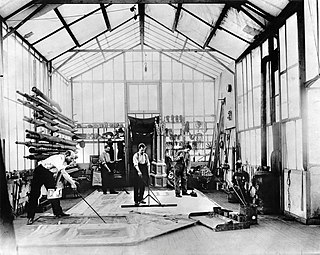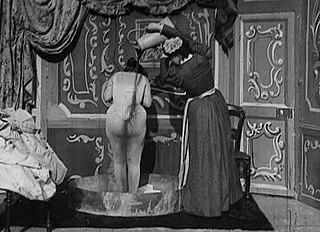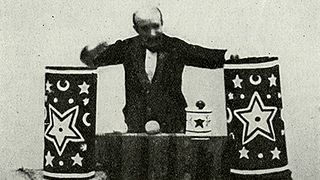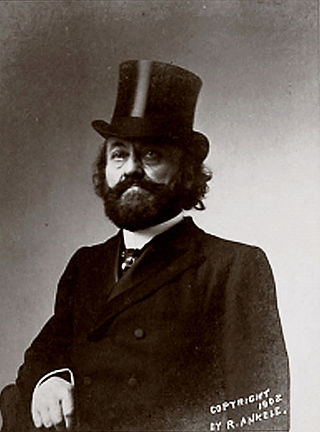Related Research Articles
The following is an overview of the events of 1896 in film, including a list of films released and notable births.

Georges Méliès (1861–1938) was a French filmmaker and magician generally regarded as the first person to recognize the potential of narrative film. He made about 520 films between 1896 and 1912, covering a range of genres including trick films, fantasies, comedies, advertisements, satires, costume dramas, literary adaptations, erotic films, melodramas, and imaginary voyages. His works are often considered as important precursors to modern narrative cinema, though some recent scholars have argued that Méliès's films are better understood as spectacular theatrical creations rooted in the 19th-century féerie tradition.

Cinderella is an 1899 French trick film directed by Georges Méliès, based on the fairy tale by Charles Perrault. It was released by Méliès's Star Film Company and is numbered 219–224 in its catalogues, where it is advertised as a grande féerie extraordinaire en 20 tableaux.

A Terrible Night is an 1896 French silent comic trick film by Georges Méliès, who is also the actor in the film. It was released by Méliès's Star Film Company and is numbered 26 in its catalogues, where it is listed with the descriptive subtitle scène comique.

After the Ball is an 1897 French short silent film made by Georges Méliès. It was sold by Méliès's Star Film Company and numbered 128 in its catalogues.

The Dreyfus Affair, also known as Dreyfus Court-Martial, is an 1899 series of eleven short silent films by Georges Méliès. Each of the eleven one-minute installments reconstructs an event from the real-life Dreyfus affair, which was still in progress while the series was being made. The series follows the case from Alfred Dreyfus's arrest on suspicion of espionage, through his imprisonments on Devil's Island and in Rennes, to his trial and conviction for treason; related events are also included, including the suicide of a main Dreyfus accuser, an unknown gunman's attempt to murder Dreyfus's attorney, and a public conflict between pro- and anti-Dreyfus factions. The series was acted in a restrained, realistic style vastly unlike Méliès's better-known fantasy films; the scenes were staged and advertised to suggest accurately that Dreyfus was innocent of espionage and had been framed.

Humanity Through the Ages, released in the US initially as Humanity Through Ages, is a 1908 historical drama film directed by Georges Méliès. The film, now presumed lost, is an episodic narrative displaying examples of humankind's brutality, from the story of Cain and Abel through the Hague Convention of 1907.

The French filmmaker and magician Georges Méliès (1861–1938) is the subject of various written works, including biographies, essays, and monographs. The literature about him is abundant and spans many decades and languages, including English, French, Italian, Spanish, and German. Frank Kessler, a professor of media history, believes Méliès is arguably the most written about early filmmaker. Conversely, his name often appears in the titles of works not necessarily because his films are discussed but rather to signify the concept or time period of early cinema. Works in this bibliography have been reviewed in magazines or journals or are included in annotated bibliographies by Stéphane Tralongo or Elizabeth Ezra.
An Hallucinated Alchemist, also known as The Alchemist's Hallucination, was an 1897 French silent trick film directed by Georges Méliés. This film is lost. The videos online are not this film, but actually of The Mysterious Retort (1906).

French Cops Learning English, originally copyrighted in the United States as French Interpreter Policeman, is a 1908 French short silent comedy film directed by Georges Méliès. It was released by Méliès's Star Film Company and is numbered 1288–1293 in its catalogues.
Seein' Things, also known as Seeing Things, was a 1908 French short silent comedy film directed by Georges Méliès.
Le Congrès des Nations en Chine, released in the US as China Versus Allied Powers and in the UK as China Versus the Allied Nations, and also known as The Congress of Nations in China: A Topical Creation and China Against the Allies, was a 1900 French silent satirical trick film directed by Georges Méliès. It was released by Méliès's Star Film Company and is numbered 327 in its catalogues.

Conjuring is a 1896 French silent trick film directed by Georges Méliès, who is also the actor doing the "conjuring".

The Untamable Whiskers, also known as The King of the Mackerel Fishers and Les Moustaches indomptables, is a 1904 French silent trick film directed by Georges Méliès. The film is a showpiece for Méliès himself, drawing quickfire sketches of various characters and magically transforming into them.
A Private Dinner was an 1897 French short silent film by Georges Méliès. It was sold by Méliès's Star Film Company and is numbered 127 in its catalogues.

The Diabolical Church Window is a 1911 French short silent film by Georges Méliès. It was numbered 1548–1556 for the catalogues of Méliès's Star Film Company, but it was ultimately produced and distributed by Pathé Frères, who advertised it as with the subtitle magie vénitienne.

Moitié de polka was a 1908 French short silent film by Georges Méliès. It was sold by Méliès's Star Film Company and is numbered 1386–1393 in its catalogues.

Le Nouveau Seigneur du village, also known as On ne badine pas avec l'amour, and known in English as No Trifling With Love and as The New Lord of the Village, is a 1908 French silent trick film released by Georges Méliès, and supervised by an actor-director employee of Méliès's, known as Manuel.
References
- 1 2 Hammond, Paul (1974). Marvellous Méliès. London: Gordon Fraser. pp. 135–6. ISBN 0900406380.
- 1 2 3 4 Malthête, Jacques; Mannoni, Laurent (2008), L'oeuvre de Georges Méliès, Paris: Éditions de La Martinière, p. 50, ISBN 9782732437323
- ↑ Frazer, John (1979), Artificially Arranged Scenes: The Films of Georges Méliès, Boston: G. K. Hall & Co., p. 136, ISBN 0816183686
- ↑ Release data from Malthête & Mannoni 2008 , pp. 336–7; subject identification from Malthête & Mannoni 2008 , p. 50.